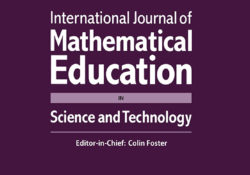eric.ed.gov har udgivet: Case study research suggests that NLP [neuro-linguistic programming] influencing strategies benefit teacher effectiveness. Maths pedagogy involving higher-order questioning, challenge, problem solving and collaborative working may be a way of improving attainment in adult numeracy learning, however, such strategies may be less effective if the relationship between teacher and learner does not reflect sensitivity to attitudes, beliefs and emotions (areas in which advocates of NLP claim effectiveness). The present study investigated these claims and the combined effect of such approaches using a pre- and post-treatment test design with 173 adult numeracy learners. Teachers were randomly allocated to three conditions, these were: (1) teachers given no training (control condition); (2) teachers trained in innovative maths pedagogy (including more frequent higher-order questioning, challenge, problem solving and collaborative learning); and (3)… Continue Reading →
Like this:
Like Loading...
tandfonline.com har udgivet en rapport under søgningen “Teacher Education Mathematics”: ABSTRACT Formulae display:?Mathematical formulae have been encoded as MathML and are displayed in this HTML version using MathJax in order to improve their display. Uncheck the box to turn MathJax off. This feature requires Javascript. Click on a formula to zoom. ABSTRACT This article investigates how the recent implementation of programming in school mathematics interacts with algebraic thinking and learning. Based on Duval’s theory of semiotic representations, we analyze in what ways syntax and semantics of programming languages are aligned with or divert from corresponding algebraic symbolism. Three examples of programming activities suggested for school mathematics are discussed in detail. We argue that although the semiotic representations of programming languages are similar to algebraic notation the meanings of several concepts… Continue Reading →
Like this:
Like Loading...
tandfonline.com har udgivet en rapport under søgningen “Teacher Education Mathematics”: ABSTRACT ABSTRACT This article explores the features of students’ reasoning and sense-making when computer programming and mathematics interact, specifically, using the exterior angle concept to make different regular polygons with Scratch as a programming tool. At the end of the 2019 spring term in a public elementary school, data were obtained from a pretest, a posttest, programming tasks, surveys, audio recordings, and research field notes. Fifty-six students aged 13–14 years participated in the study. Concepts from variation theory in combination with a post-structuralist philosophical perspective were used to analyse what features of tasks allow students to experience reasoning and sense-making and what features are discerned in students’ reasoning and sense-making. The results illustrate the features of tasks as well as… Continue Reading →
Like this:
Like Loading...
tandfonline.com har udgivet en rapport under søgningen “Teacher Education Mathematics”: Abstract Abstract Nolan and Temple Lang’s Computing in the Statistics Curricula (2010) advocated for a shift in statistical education to broadly include computing. In the time since, individuals with training in both computing and statistics have become increasingly employable in the burgeoning data science field. In response, universities have developed new courses and programs to meet the growing demand for data science education. To address this demand we created Data Science in Practice, a large-enrollment undergraduate course. Here, we present our goals for teaching this course, including: (1) conceptualizing data science as creative problem solving, with a focus on project-based learning, (2) prioritizing practical application, teaching and using standardized tools and best practices, and (3) scaling education through coursework that… Continue Reading →
Like this:
Like Loading...


